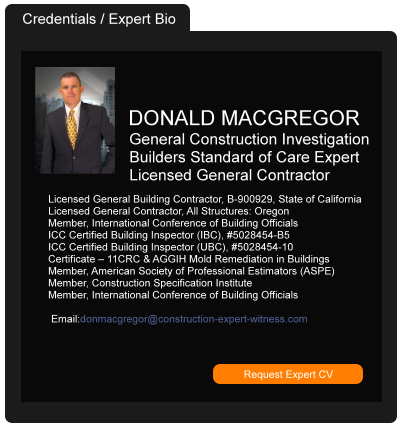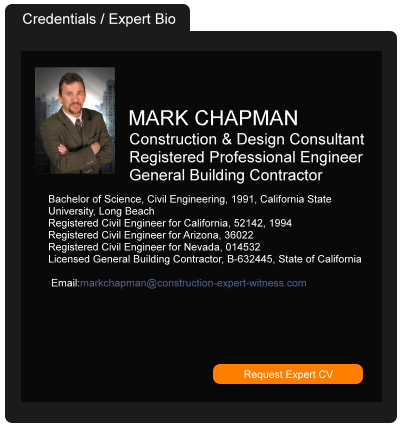Federal Contractors – Double Check the Terms of Your Contract Before Performing Ordered Changes
July 08, 2019 —
Jonathan Schirmer - Ahlers Cressman & Sleight PLLCAs federal contractors may be aware, the general rule when performing a contract for the federal government is that only the contracting officer (“CO”) can bind the government. Often, the CO delegates responsibility to a contracting officer’s representative (“COR”). While in some cases a COR may be able to bind the federal government, the contract may limit that ability exclusively to the CO.
Important for our clients, it is the responsibility of the contractor to determine whether the COR can legally bind the federal government when ordering changes to the scope of work. [1] This is true even when a COR possesses apparent authority to order changes to the work, and when the project is almost exclusively overseen by COR’s. [2]
A recent case highlights the dangers of a contractor relying on the orders of a COR when performing work outside the scope of a contract. In Baistar Mechanical Inc., a contractor was awarded a maintenance and snow removal contract with the federal government. The contract expressly stated that only the CO had contracting authority regarding additional or changed work. [3] However, Baistar, the contractor, argued it was directed by the contracting officer’s representatives to perform work outside of the contract.
Read the court decisionRead the full story...Reprinted courtesy of
Jonathan Schirmer, Ahlers Cressman & Sleight PLLCMr. Schirmer may be contacted at
jonathan.schirmer@acslawyers.com
Expired Contract Not Revived Due to Sovereign Immunity and the Ex Contractu Clause
October 27, 2016 —
Chadd Reynolds and David Cook – Autry, Hanrahan, Hall & Cook, LLPA few months ago, a decision by the Supreme Court of Georgia in Georgia Department of Labor v. RTT Associates, Inc. provided a strict rule for contractors that work with state agencies to determine whether a state agency has waived its sovereign immunity. The issue as framed by the Court was “whether an agency’s waiver of immunity from a breach of contract claim as a result of entering into a written contract remains intact in the event the contract is extended without a written document signed by both parties expressly amending the contract, as required by its terms.”
Reprinted courtesy of
David Cook, Autry, Hanrahan, Hall & Cook, LLP and
Chadd Reynolds, Autry, Hanrahan, Hall & Cook, LLP
Mr. Cook may be contacted at cook@ahclaw.com
Mr. Reynolds may be contacted at reynolds@ahclaw.com
Read the court decisionRead the full story...Reprinted courtesy of
Moving Toward a Telework Future: A Checklist of Considerations for Employers
July 27, 2020 —
Daniel F. Fears & Raymond J. Nhan - Payne & FearsBusinesses contemplating moving to a virtual workplace in this post-COVID-19 world must consider the legal ramifications of such decisions. Virtual workplaces may provide businesses with many benefits, such as cost savings, access to a more geographically diverse worker pool and the possibility of more flexible employment relationships. But a virtual workplace may also include hidden employment-related issues, costs, and traps. This is especially so for California-based companies.
This article identifies some of the significant employment-law issues related to transitioning to a virtual workplace. Specifically, this article analyzes three scenarios: (1) employers seeking to have their workers continue working from home; (2) workers desiring to continue working from home — and specifically, seeking to work outside of California; and (3) the hiring of new employees.
Reprinted courtesy of
Daniel F. Fears, Payne & Fears and
Raymond J. Nhan, Payne & Fears
Mr. Fears may be contacted at dff@paynefears.com
Mr. Nhan may be contacted at rjn@paynefears.com
Read the court decisionRead the full story...Reprinted courtesy of
Unlocking the Hidden Power of Zoning, for Good or Bad
October 21, 2024 —
David Zipper - BloombergNo longer dismissed as an insomnia-curing corner of local governance, zoning is having a moment. It’s at the heart of the pro-housing Yes In My Backyard — or YIMBY — movement, which seeks to reform the rules that mandate the construction of single-family homes across much of the US, and the arcane details of land use policy are being debated in national outlets and city councils across the US. In much of this discourse, zoning is the clear villain, blamed for feeding societal ills ranging from housing costs to racial discrimination to greenhouse gas emissions.
In her new book Key to the City, Sara Bronin examines zoning with a critical but sympathetic eye. Bronin brings deep experience to the topic, having studied zoning as an architect and lawyer before overhauling the land use regulations of Hartford, Connecticut. A professor of architecture and planning at Cornell University (and an occasional Bloomberg CityLab contributor), she is currently on leave to chair the federal Advisory Council on Historic Preservation.
Read the court decisionRead the full story...Reprinted courtesy of
David Zipper, Bloomberg
Important New Reporting Requirement for Some Construction Defect Settlements
April 17, 2019 —
Ian Williamson - Gordon & Rees Construction Law BlogIn response to a tragic balcony collapse incident where the public later learned the contractor had paid millions to settlement defect cases in the preceding years, the California legislature passed, the state contractor’s license board is now implementing, a public disclosure requirement for certain construction defect claims. The disclosure requirement is triggered by a judgment (which is not a new requirement), an arbitration award, or a settlement of certain construction defect claims. These requirements are codified at California Business & Professions Code sections 7071.20-22.
What types of Projects: This requirement applies only if all of the following apply:
A) Residential
B) Multi-Family; and
C) Rental property
Limitations on Claims – The reporting requirement only applies if all of the following are true:
A) The claim is against a CSLB licensee (not a design professional) acting in the capacity of a contractor;
B) The claim is for a structural defect;
C) The total claim is valued at $1 million (not including investigation costs);
D) SB800 does not apply;
E) The action was filed after January 1, 2019; and
F) If a lawsuit, the case was designated complex by the courts (which may not apply if only contractor is sued).
Read the court decisionRead the full story...Reprinted courtesy of
Ian Williamson, Gordon & ReesMr. Williamson may be contacted at
igwilliamson@grsm.com
California to Require Disclosure of Construction Defect Claims
October 30, 2013 —
CDJ STAFFCalifornia Governor Jerry Brown has signed Senate Bill 625. Starting in July 2014, anyone who sells a home will have to disclose all claims made of construction defects and the status of these claims.
Read the court decisionRead the full story...Reprinted courtesy of
Another Colorado Construction Defect Reform Bill Dies
May 07, 2014 —
Beverley BevenFlorez-CDJ STAFFColorado construction defects reform Senate Bill 220 died when “Senate President Morgan Carroll, D-Aurora, declined to call a second committee to hear” the bill, according to Ed Sealover writing for the Denver Business Journal. Sen. Carroll declared that the “bill backers” did not incorporate any of the “suggestions she or House Speaker Mark Ferrandino had given them.”
“SB 220 would have required condo-unit owners to submit to alternative-dispute resolution such as arbitration or mediation if the unit developer required it,” Sealover reported. “And it would have required that a majority of members of a homeowners association agree to file a lawsuit, a standard significantly larger than the two-person bar that now must be met.”
Bill Cosponsor Sen. Mark Scheffel, R-Castle Rock, “believes litigation reform” will become “an election issue and” that it “has strong momentum heading into the 2015 session.”
Read the court decisionRead the full story...Reprinted courtesy of
Dreyer v. Am. Natl. Prop. & Cas. Co. Or: Do Not Enter into Nunn-Agreements for Injuries that Occurred After Expiration of the Subject Insurance Policy
January 20, 2020 —
Jean Meyer - Colorado Construction LitigationWhile Nunn-Agreements[1] may be appealing for both plaintiffs and defendants where an insurer unreasonably fails to defend a lawsuit, a recent opinion from The Honorable Marcia Krieger in the United States District Court of Colorado[2] (“Opinion”) demonstrates the importance of first confirming that there exists a viable insurance claim before proceeding with such a Nunn- Agreement.
The facts giving rise to the Opinion were as follows. In March 2015, a Homeowner couple (the “Homeowners”) suffered damages to their home resulting from a brushfire. Fortunately, the Homeowners were insured, they submitted their claim to their homeowners’ insurance carrier which was in effect at the time of the brushfire (the “Insurance Carrier”), and the Insurance Carrier paid the claim. Ostensibly as part of the Homeowners’ remediation efforts to their home they removed a large bush which left a hole in the ground. After paying the claim, in August 2015 the Insurance Carrier cancelled or elected not to renew the Homeowners’ policy. In October 2015, a repairman working on the Home (the “Repairman”) was injured after his ladder fell over allegedly because of the hole in the ground caused by the bush that had been removed.
As a result of injuries caused by the fall from the ladder, the Repairman brought suit against the Homeowners. In response to the Repairman’s claim, the Homeowners again tendered to their Insurance Carrier. This time, however, the Insurance Carrier denied coverage on the basis that the Repairman’s injuries occurred after the expiration of the relevant policy. Without insurance coverage, the Homeowner’s entered into a Nunn-Agreement with the Repairman, conceding liability, and assigning any claims they might have had against the Insurance Carrier in lieu of execution of any judgment against the Homeowners.
Read the court decisionRead the full story...Reprinted courtesy of
Jean Meyer, Higgins, Hopkins, McLain & Roswell, LLCMr. Meyer may be contacted at
meyer@hhmrlaw.com


































































